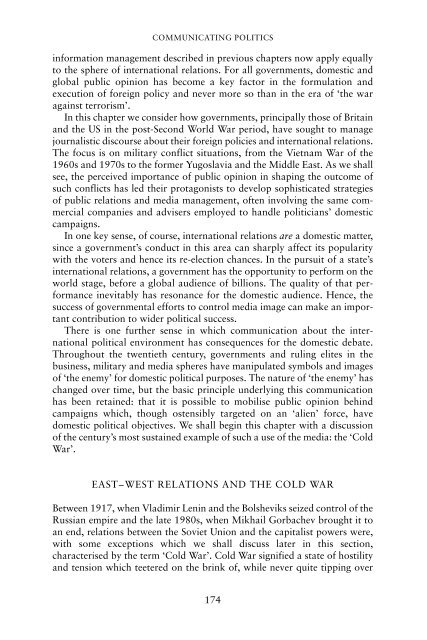20130412164339753295_book_an-introduction-to-political-communication
20130412164339753295_book_an-introduction-to-political-communication
20130412164339753295_book_an-introduction-to-political-communication
You also want an ePaper? Increase the reach of your titles
YUMPU automatically turns print PDFs into web optimized ePapers that Google loves.
COMMUNICATING POLITICS<br />
information m<strong>an</strong>agement described in previous chapters now apply equally<br />
<strong>to</strong> the sphere of international relations. For all governments, domestic <strong>an</strong>d<br />
global public opinion has become a key fac<strong>to</strong>r in the formulation <strong>an</strong>d<br />
execution of foreign policy <strong>an</strong>d never more so th<strong>an</strong> in the era of ‘the war<br />
against terrorism’.<br />
In this chapter we consider how governments, principally those of Britain<br />
<strong>an</strong>d the US in the post-Second World War period, have sought <strong>to</strong> m<strong>an</strong>age<br />
journalistic discourse about their foreign policies <strong>an</strong>d international relations.<br />
The focus is on military conflict situations, from the Vietnam War of the<br />
1960s <strong>an</strong>d 1970s <strong>to</strong> the former Yugoslavia <strong>an</strong>d the Middle East. As we shall<br />
see, the perceived import<strong>an</strong>ce of public opinion in shaping the outcome of<br />
such conflicts has led their protagonists <strong>to</strong> develop sophisticated strategies<br />
of public relations <strong>an</strong>d media m<strong>an</strong>agement, often involving the same commercial<br />
comp<strong>an</strong>ies <strong>an</strong>d advisers employed <strong>to</strong> h<strong>an</strong>dle politici<strong>an</strong>s’ domestic<br />
campaigns.<br />
In one key sense, of course, international relations are a domestic matter,<br />
since a government’s conduct in this area c<strong>an</strong> sharply affect its popularity<br />
with the voters <strong>an</strong>d hence its re-election ch<strong>an</strong>ces. In the pursuit of a state’s<br />
international relations, a government has the opportunity <strong>to</strong> perform on the<br />
world stage, before a global audience of billions. The quality of that perform<strong>an</strong>ce<br />
inevitably has reson<strong>an</strong>ce for the domestic audience. Hence, the<br />
success of governmental efforts <strong>to</strong> control media image c<strong>an</strong> make <strong>an</strong> import<strong>an</strong>t<br />
contribution <strong>to</strong> wider <strong>political</strong> success.<br />
There is one further sense in which <strong>communication</strong> about the international<br />
<strong>political</strong> environment has consequences for the domestic debate.<br />
Throughout the twentieth century, governments <strong>an</strong>d ruling elites in the<br />
business, military <strong>an</strong>d media spheres have m<strong>an</strong>ipulated symbols <strong>an</strong>d images<br />
of ‘the enemy’ for domestic <strong>political</strong> purposes. The nature of ‘the enemy’ has<br />
ch<strong>an</strong>ged over time, but the basic principle underlying this <strong>communication</strong><br />
has been retained: that it is possible <strong>to</strong> mobilise public opinion behind<br />
campaigns which, though ostensibly targeted on <strong>an</strong> ‘alien’ force, have<br />
domestic <strong>political</strong> objectives. We shall begin this chapter with a discussion<br />
of the century’s most sustained example of such a use of the media: the ‘Cold<br />
War’.<br />
EAST–WEST RELATIONS AND THE COLD WAR<br />
Between 1917, when Vladimir Lenin <strong>an</strong>d the Bolsheviks seized control of the<br />
Russi<strong>an</strong> empire <strong>an</strong>d the late 1980s, when Mikhail Gorbachev brought it <strong>to</strong><br />
<strong>an</strong> end, relations between the Soviet Union <strong>an</strong>d the capitalist powers were,<br />
with some exceptions which we shall discuss later in this section,<br />
characterised by the term ‘Cold War’. Cold War signified a state of hostility<br />
<strong>an</strong>d tension which teetered on the brink of, while never quite tipping over<br />
174
















